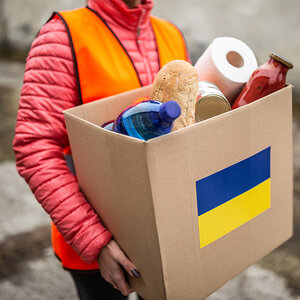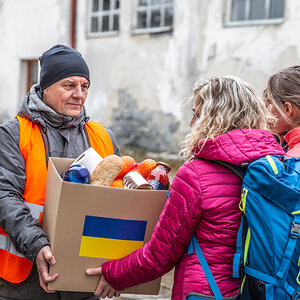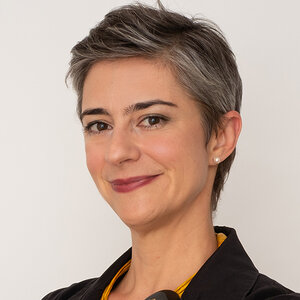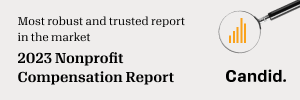Nick Deychakiwsky, Senior Program Officer, Charles Stewart Mott Foundation: Maintaining civil society in war-torn Ukraine
February 24, 2023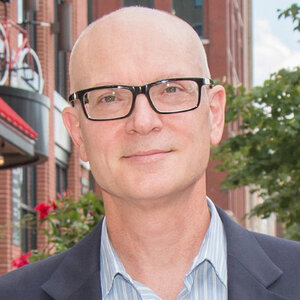
For Nick Deychakiwsky, senior program officer for the Civil Society program at the Charles Stewart Mott Foundation, the war in Ukraine is personal. His parents fled Ukraine during World War II, and he still has family in the western region of the country. He worked in Kyiv for nearly a decade in the 1990s. He met his wife in Ukraine. Her sister and their 16-year-old niece came to stay with them in the fall but, despite occasional missile attacks on Kyiv, went home at the end of last year.
“Even with the risk, the pull of home was just too strong, especially for my niece,” Deychakiwsky said.
His familiarity with the country and its civil society infrastructure—as well as Mott’s history of supporting civil society and long-term partners there—helped position the foundation to respond swiftly to urgent needs arising from the war. PND initially spoke with Deychakiwsky in November 2022 and again earlier this year about the foundation’s efforts in Ukraine, both historically and currently, and what the war might mean for philanthropic organizations going forward.
Philanthropy News Digest: According to the data that Candid has collected about the philanthropic response to the war in Ukraine, the Mott Foundation committed around $3 million in 2022. Can you summarize the foundation’s history in Ukraine?
Nick Deychakiwsky: Actually, the exact figure was $2.725 million, as Candid’s data included some regional work in Eastern Europe not related to the war. Regarding our history of engagement with Ukraine, we have had some programming and exploratory grants there since the late 1980s. The Mott Foundation and, in particular, our leader at the time, the late Bill White, was very interested in the opportunity to help the transformation of what we all thought would be an easier and more complete process than happened, from Communism to democratic societies and market economies and the like. Specifically, deliberate programming focusing first on Russia and then Ukraine started in the 1990s, so we’ve been supporting work there for quite a while. It was all in the frame of civil society, helping to nurture a nonprofit sector and support civic engagement. We also helped fund nonpartisan democracy-supporting work—get-out-the-vote activities and voter education, for example. At our peak, we were providing between $1 million and $2 million a year in grantmaking to Ukraine.
We had been funding in the broader region: Poland, Hungary, Czech Republic, Slovakia, and later Bulgaria, Romania, and the Balkan states. But, as many of those countries started integrating more deeply into Europe and got on their feet — particularly economically but also politically—we were slowly easing out of our programming in Central and Eastern Europe starting in the mid-2000s. The decline in funding to Ukraine started later, around 2018, with the adoption of a new civil society program plan. At that time, instead of a geographic approach to organizing our program areas, we switched to a thematic approach. We decided to support legal advice center networks in Ukraine as part of our current Access to Justice program area, which is country-specific. Overall, the foundation’s Civil Society efforts started shifting geographically to other places. We’re in Latin America more than we ever were, and in more countries in Africa than we were before.
PND: Can you outline what the new grants in Ukraine were for last year?
ND: Out of the $2.725 million we committed to support Ukraine and its people in 2022, approximately $300,000 was already programmed money for the legal advice centers. The additional $2.425 million was for grant increases to the advice centers and other responses to the invasion of February 24. We recognized that we were working in Ukraine already. We had some established relationships, and we hoped to help those institutions we’ve supported through these tough times. A fair amount went to community foundations in Ukraine through Ednannia, a Ukrainian regranting organization. A large amount went through a Polish intermediary to community foundations that were helping to deal with Ukrainian refugees who were in Poland, Romania, Hungary, and other European countries. The idea was to help European community foundations as they dealt with Ukrainian refugees in their communities.
We provided additional support to the Network of European Foundations’ European Programme for Integration and Migration, which we have been supporting for many years. We also awarded funds to the People in Need Foundation, another long-term grantee. People in Need provides grants to civil society organizations that are under duress. Ukraine’s civil society sector wasn’t under a lot of duress until this invasion. The funding was to help support independent media groups and civil society groups, primarily advocacy organizations, in Ukraine. We believe that documenting human rights abuses and war crimes is not only important in terms of justice for victims and accountability for perpetrators, but also necessary for civil society to foster healing and promote social cohesion.
I have also worked with some other organizations [to get] behind raising awareness and discussing ways in which philanthropy in the United States and Canada can continue to or newly invest in Ukraine beyond that initial emergency response—thinking longer term and more strategically. Are there areas of work that can align to foundations’ strategies that give them reason to continue [with ongoing support]?
I have also worked with some other organizations [to get] behind raising awareness and discussing ways in which philanthropy in the United States and Canada can continue to or newly invest in Ukraine beyond that initial emergency response—thinking longer term and more strategically.
And so, in October of 2022, a briefing series for philanthropy in North America was launched. The Council on Foundations is providing the platform and, together with Community Foundations of Canada and Philanthropic Foundations Canada, they’re providing a lot of the marketing and help in thinking through topics and speakers. The German Marshall Fund of the United States is the lead on setting up the programming in concert with the other organizations that are in Ukraine.
I hope this series will lead to more foundations designing and doing something for the long term. It might be that they’ll find things that already align with what they’re interested in. For example, you might have an education funder who learns that the schools in Ukraine need to build bomb shelters and need online access to their teachers, many of whom are currently outside of the country in other parts of Europe. Other adjustments might be needed in education policies, and there may be excellent opportunities to pilot innovative approaches.
Environmental funding isn’t my area, but Ukraine’s environment is being degraded because of the ordnance and mines and explosives blowing up fuel terminals. There is a desire to have a more renewable energy economy. So, perhaps here’s an opportunity for an environmental funder to say, “Maybe we can support that.” The leaders of the series want to set up a system where conversations can take place that could lead to groupings or clusters of funders that say they want to go deeper in that area.
PND: Can you give a quick summary of what’s been talked about during these calls?
The first call in October set the stage and context about where Ukrainian society was at the time and what the areas philanthropy could address in the near and longer term were. Speakers included Ukraine’s ambassador to the United States, Oksana Markarova, and former Canadian ambassador to Ukraine Roman Washchuk.
The November call was focused on the continuing need for humanitarian support, making the point that it was still necessary, especially to get through the winter while Russia was attacking Ukraine’s energy infrastructure. Speakers from USAID, HIAS, and Razom emphasized that there were many groups on the ground and a lot of capacity in Ukrainian society to help channel the aid and get it to where it’s needed.
On the December call, which was about the present state of Ukrainian civil society, Carl Gershman, the former chair of the National Endowment for Democracy, reminded people about why Ukraine’s victory in this war is essential to democracy more broadly. Speakers from the Open Society Foundations relayed what they are doing to build international solidarity with Ukraine and how best to address the ongoing needs of Ukrainian civil society.
In January, speakers from the government of Canada, a Canadian community foundation, and a refugee assistance agency from Cleveland talked about how they welcomed and supported the arrival of Ukrainians and helped them access various newly developed programs and services.
On February 24, the one-year anniversary of Russia’s full-scale invasion, North American funders will be joined by European funders, through Philea, not only to learn about each other’s efforts but to hear from 2022 Nobel Peace Prize winner Oleksandra Matviichuk, who heads the Center for Civil Liberties in Kyiv.
PND: Is support to Ukraine a new grant area that a lot of foundations need to consider?
ND: I can’t say if it would have to be a new grant area. That is for foundations themselves to decide within the context of their objectives and programmatic structures. Even though the Mott Foundation has a long history of grantmaking in Ukraine, we, too, need to think about the context and how it fits with our current goals and objectives.
What I can tell you is that the need will still exist. Sadly, and unfortunately, this is different than typical disaster philanthropy. Usually that is a response to a natural occurrence, such as an earthquake, a hurricane, wildfires. They happen, and then you have to deal with the aftermath. Obviously, that aftermath takes a long time, but it’s still seen as a one-time event.
Here we have the dilemma that the crisis continues. There’s a lot of hope that the war will end soon, but who knows? Ukraine itself and the European Union already are laying plans for recovery and rebuilding, reconstruction. But that’s awfully hard to do when the missiles are still falling, and the military is still on the front fighting.
The country is facing a lot more pressure, even beyond the war zones. It’s not only hard to talk about but also hard to do anything on land controlled by the invader. But even outside the occupied territories, a lot of people have fled, mostly women and children. Most of the country’s teachers were women, so the education system is severely strained. Then you have so many internally displaced people. You have issues of housing, as well as humanitarian, legal, and medical matters, all in a severely contracting economy that already dries up the internal money that might be available for routine things that need to happen. Giving has actually gone up since the beginning of the war, but so much of that goes to the war effort, to making sure those fighting have warm clothes, to helping the families of the soldiers who were killed or maimed. The way civil society operates in normal times—that’s under huge duress.
PND: Has the support Mott and other foundations kept civil society in Ukraine from being crushed? Is it making the sector stronger and more resilient?
ND: It’s the people of Ukraine who are ensuring that civil society doesn’t get crushed. In fact, Mott’s approach has always been that it’s about the people and communities where we make grants. It’s they who are doing the work and making civil society strong and resilient. Our funding is critically important, but it’s only one part of the equation.
Anecdotally, what we’ve heard is that people are organizing. A lot of it is informal, but there are also formal organizations working in emergency mode. I’ve been told that everybody is burning through reserves. The line between what’s volunteer and what’s paid starts blurring. But at the same time, that can only go on for so long. I was already hearing about people saying, “We need laptops!” When the electricity goes down, they take a laptop to a center or café where they run a generator and continue to do their work.
It’s the people of Ukraine who are ensuring that civil society doesn’t get crushed...doing the work and making civil society strong and resilient. Our funding is critically important, but it’s only one part of the equation.
Many civil society organizations are still managing, but their funding is becoming more difficult—not because people have stopped giving; they’re giving for the war effort.
PND: How do you assess these organizations and evaluate the effectiveness of your funding and assess the foundation’s impact in a setting like this? They’re literally in a war zone.
ND: Obviously it is difficult. But I will say this: I feel really grateful for the work of so many funders, including the Mott Foundation, that have supported civil society development in Ukraine. We know that it isn’t perfect. It’s still a bit disorganized. At times since independence in 1991, the government would try to clamp it and shut it down, but it’s thrived much better than, say, in Russia or Belarus.
Civil society in Ukraine had a couple shocks that helped propel it: the two revolutions, the Orange Revolution in 2004 and the Revolution of Dignity in 2014, where people came together and said, “We have to do something, we have to make it happen.” That has penetrated the culture: the sense of, “It’s up to us,” rather than, “It’s the government’s job to make it happen.” I think there’s something there to build on.
We are lucky that we have good partners on the ground from before the invasion. There are other organizations that are also trusted because there’s always an issue of trust in a country that has been known for corruption. But there are a lot of good organizations with reliable contacts that can monitor the “people level” and be accountable. Razom is one of them, for example. They have great on-the-ground connections.
We at the Mott Foundation have a lot of confidence in community foundations—not only in Ukraine, but elsewhere around the world—because we have seen that they know their communities, they know who’s doing what and what the community needs most.
PND: How much more difficult is it for Mott to evaluate and do what you’re trying to do right now? Has the process of philanthropy become more difficult as a result of the Ukraine crisis?
ND: I don’t think the process has become more difficult. From what I’ve seen just even going through Candid’s data showing who’s giving and how, the impulse to help is there, and the realization that there’s no justification for what happened is understood. The Russians have come in an extremely cruel and brutal way, saying, “We don’t think this nation should even exist.” An occupied territory gets freed, and what do you find? A mass grave, torture chambers, Ukrainian books burned, artworks stolen. It’s truly horrible, but it’s pretty clear. So, there’s a factor of empathy, of seeing suffering and refugees, which has resulted in philanthropies extending themselves to expedite grants and help organizations through the application and reporting processes. They’re not saying, “Let’s go in and study first, do an assessment.” The Ukrainian government certainly has relaxed any barriers for philanthropy to come in. There’s not an issue there.
But it does require some thought. I’d say most funders in North America would say, “Ukraine’s not in our geography.” I’d love to see [foundations] say, “We’re for civil society more broadly and democracy, and the strength of what happens in Ukraine will be important for what happens around the world.” It’s not just about Ukraine itself. A climate change funder might say, “We weren’t working in Ukraine.” On the other hand, this might be a key after-war scenario. It might be a great example for other countries of how they might move to a greener economy.
I’d love to see [foundations] say, “We’re for civil society more broadly and democracy, and the strength of what happens in Ukraine will be important for what happens around the world.” It’s not just about Ukraine itself.
PND: Do you think the war will become a point of demarcation for the future of philanthropy? Will more foundations say, “We need to address this and rethink everything?”
ND: I don’t know that it’ll be a line of demarcation for the future of philanthropy. I know this will sound grand, but I think it’s a demarcation for the future of the world. You have a nuclear power that decides it can just invade and says, “That territory is ours, and those people don’t exist.” If that is allowed to stand, we’re going to get a lot more violent approaches to solving issues of resources and territory throughout the world.
Ukraine keeps stressing that it is striving for democracy, and compared to Russia, they’re much more democratic. They had a president who got elected out of the blue because people weren’t happy with what happened before. There have been regular elections in Ukraine. There is a vibrant civil society. That is a good example that can help other places where civil society is under stress because of authoritarian tendencies like in Mexico, Tanzania, Hungary, the Philippines, India. Even in our country, unfortunately, there are tendencies to try to limit civil society.
So, I think this could be a watershed moment. It’s not one fixed point in time, but it helps turn the tide against the trend we’ve seen for the past 15 years. If you look at Freedom House or CIVICUS Monitor, they’re all showing that the world in general is becoming less free. If Putin and Russia win on this one, even partially, I think that will only continue that trend. But if Russia is defeated, meaning they’re pushed back out of Ukraine and stopped from expanding further, then that offers a chance for the trend to go the other way.
— Matt Sinclair
(Photo credit: Cristina Wright/Charles Stewart Mott Foundation)


